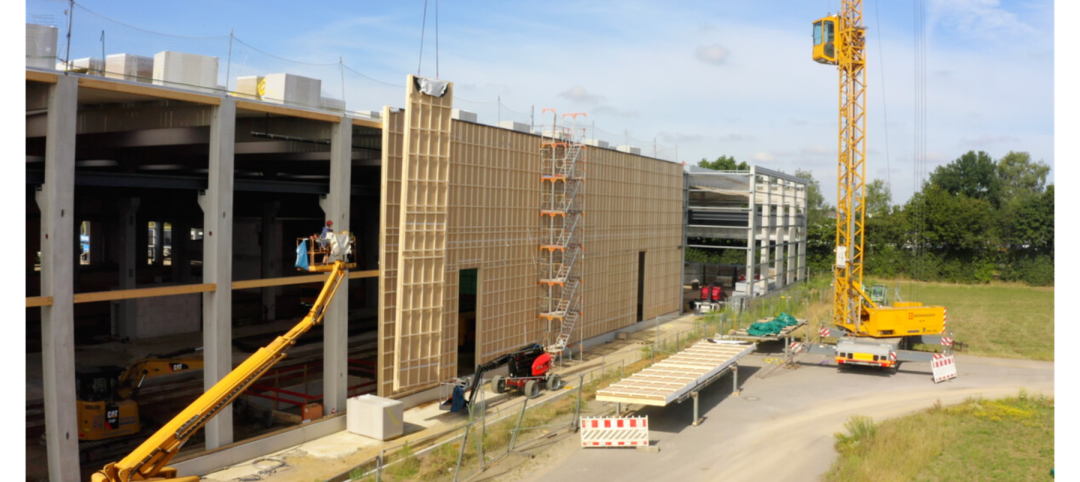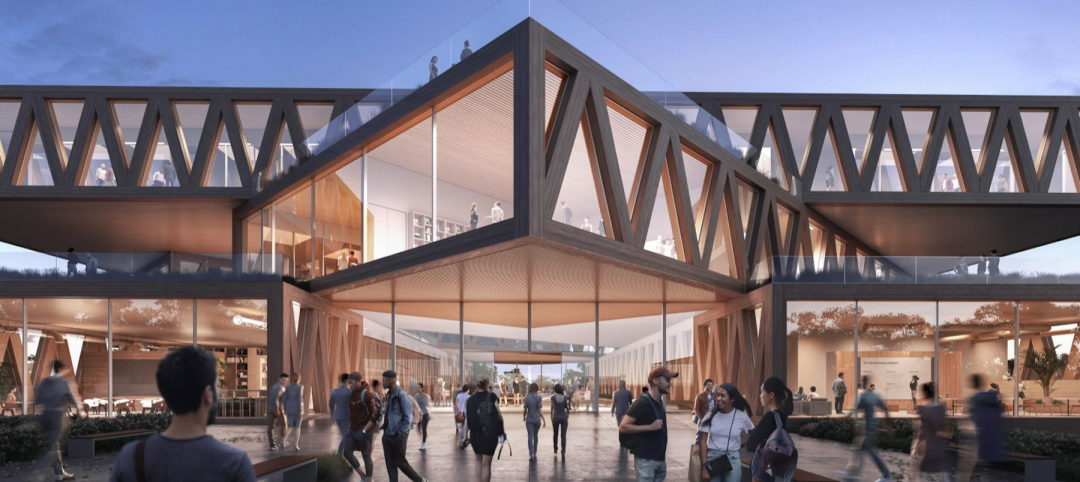Michel Bruneau, Ph.D., P.E., professor of civil, structural, and environmental engineering (CSEE) at the University of Buffalo, N.Y., is the 2012 recipient of the prestigious AISC T.R. Higgins Lectureship Award. Bruneau is being honored for his papers on steel plate shear wall design published in AISC's Engineering Journaland the proceedings of the Canadian Conference on Earthquake Engineering.
The AISC T.R. Higgins Lectureship Award is presented annually by the American Institute of Steel Construction (AISC) and recognizes an outstanding lecturer and author whose technical paper(s) are considered an outstanding contribution to the engineering literature on fabricated structural steel. The award, which includes a $15,000 prize, will be presented at the 2012 NASCC: The Steel Conference (www.aisc.org/nascc) at the Gaylord Texan Convention Center in Dallas, April 18-21.
"The Higgins jury quickly identified Michel as a top candidate, and the subsequent discussions and deliberations served to further elevate him," said Charlie Carter, AISC vice president and chief structural engineer. "The jury noted in particular the impressive extent and breadth of Michel's contributions as a researcher and engineer."
Each year the AISC Education Foundation invites a distinguished panel of industry experts to judge the nominations. The jury reflects a blend of professional insight, industry experience and academic excellence. The following jurors collaborated to select Bruneau as the recipient of this year's award:
- Jerome F. Hajjar, Ph.D., P.E., professor and chair, Northeastern University, Boston
- Mark V. Holland, P.E., chief engineer, Paxton & Vierling Steel Company, Omaha, Neb.
- Lawrence F. Kruth, P.E., vice president of engineering, technology & safety, Douglas Steel Fabricating Corporation, Lansing, Mich.
- Patrick McManus, Ph.D., P.E., S.E., structural technical director, Martin/Martin, Inc., Lakewood, Colo.
- Ralph M. Richard, Ph.D., P.E., professor emeritus, University of Arizona, Tucson
- Rafael Sabelli, S.E., director of seismic design, Walter P Moore, San Francisco
Bruneau's abundant research includes the evaluation and retrofit of existing steel bridges and buildings subjected to large destructive forces up to collapse, as well as the development of new design concepts capable of providing satisfactory seismic-resistance, blast-resistance, or both simultaneously as multi-hazard resistant concepts. This research has encompassed contributions to the development and large-scale experimental validation of various energy-dissipating design concepts to enhance the resilience of structures against extreme events: ductile steel plate shear walls, ductile bridge diaphragms, tubular eccentrically braced frames, structural fuses and controlled-rocking piers.
He has conducted numerous exploration visits to disaster stricken areas and is a member of several professional and technical code-writing committees. He also served as Director (2003-2008) and Deputy Director (1998-2003) of the Multidisciplinary Center for Earthquake Engineering Research, a National Center of Excellence funded by the National Science Foundation, the Federal Highway Administration and others. His past service to the profession includes participation in expert peer review panels, project advisory committees, special project design teams, conference advisory committees and journal editorial boards. Prior to his appointment in academia, he practiced as a consultant for architecture and engineering firms Morrison Hershfield Limited (Toronto), and Buckland and Taylor (Vancouver).
Bruneau has authored or co-authored numerous publications, including more than 100 referred journal papers, 200 papers in conference proceedings and two fiction books. He has received several awards for his technical work, as well as for his latest novel.
The AISC T.R. Higgins Award is named for Theodore R. Higgins, Ph.D., former AISC director of engineering and research, who was widely acclaimed for his many contributions to the advancement of engineering technology related to fabricated structural steel. The award honors Higgins for his innovative engineering, timely technical papers and distinguished lectures. For more information on this prestigious award, please visit www.aisc.org/TRHigginsAward.
Recent T.R. Higgins recipients include: Charles W. Roeder (2011) for his paper on Gusset Plate Connections for Seismic Design; James O. Malley (2010) for his paper on the 2005 AISC Seismic Provisions for Structural Steel Buildings, published in the First Quarter 2007 AISC Engineering Journal; Donald W. White (2009) for his papers on stability analysis and design and the flexural provisions of the 2005 AISC Specification for Structural Steel Buildings; and Walterio Lopez and Rafael Sabelli (2008) for their paper on the seismic design of buckling-restrained braced frames. BD+C
Related Stories
Codes and Standards | Nov 2, 2022
New York City construction official wants to boost design-build
The new associate commissioner of alternative delivery in New York City’s Department of Design and Construction aims to encourage more design-build project delivery in the city.
University Buildings | Nov 2, 2022
New Univ. of Calif. Riverside business school building will support hybrid learning
A design-build partnership of Moore Ruble Yudell and McCarthy Building Companies will collaborate on a new business school building at the University of California at Riverside.
Building Team | Nov 1, 2022
Nonresidential construction spending increases slightly in September, says ABC
National nonresidential construction spending was up by 0.5% in September, according to an Associated Builders and Contractors analysis of data published today by the U.S. Census Bureau.
40 Under 40 | Nov 1, 2022
40 Under 40 class of 2022 winners: Meet the architects
Of the up-and-coming AEC professionals to be named 40 Under 40 class of 2022 winners by the editors of Building Design+Construction, 22 make their living in the architecture profession.
K-12 Schools | Nov 1, 2022
Safety is the abiding design priority for K-12 schools
With some exceptions, architecture, engineering, and construction firms say renovations and adaptive reuse make up the bulk of their work in the K-12 schools sector.
| Nov 1, 2022
Updated Florida building codes helped newer homes withstand Hurricane Ian
Newer homes seemed to fare much better than older structures during Hurricane Ian, suggesting that updated Florida building codes made a difference.
Wood | Nov 1, 2022
A European manufacturer says its engineered wood products can store carbon for decades
Metsä Wood, a Finland-based manufacturer of engineered wood products, says its sustainable, material-efficient products can store carbon for decades, helping to combat climate change.
Data Centers | Oct 31, 2022
Data center construction facing record-breaking inflation, delays
Data center construction projects face record-breaking inflation amid delays to materials deliveries and competition for skilled labor, according to research from global professional services company Turner & Townsend.
School Construction | Oct 31, 2022
Claremont McKenna College science center will foster integrated disciplinary research
The design of the Robert Day Sciences Center at Claremont McKenna College will support “a powerful, multi-disciplinary, computational approach to the grand socio-scientific challenges and opportunities of our time—gene, brain, and climate,” says Hiram E. Chodosh, college president.
Energy Efficient Roofing | Oct 28, 2022
Rooftop mini turbines can pair with solar panels
A new type of wind turbine can pair well on roofs with solar panels, offering a double source of green energy generation for buildings.
















